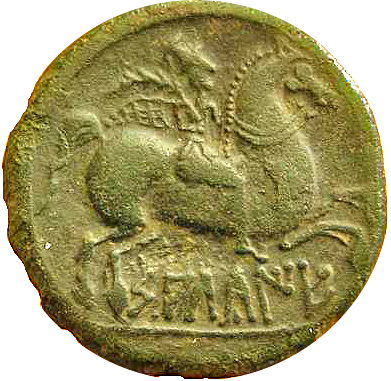Sedetani on:
[Wikipedia]
[Google]
[Amazon]
 The Sedetani were an ancient Iberian (Pre- Roman) people of the
The Sedetani were an ancient Iberian (Pre- Roman) people of the
 Like other ancient Hispanic peoples, the Sedetani minted their own coins since the early 2nd century BC.
Like other ancient Hispanic peoples, the Sedetani minted their own coins since the early 2nd century BC.
Detailed map of the Pre-Roman Peoples of Iberia (around 200 BC)
Pre-Roman peoples of the Iberian Peninsula Ancient peoples of Spain Aragon {{Spain-hist-stub
Iberian Peninsula
The Iberian Peninsula ( ), also known as Iberia, is a peninsula in south-western Europe. Mostly separated from the rest of the European landmass by the Pyrenees, it includes the territories of peninsular Spain and Continental Portugal, comprisin ...
(the Roman Hispania
Hispania was the Ancient Rome, Roman name for the Iberian Peninsula. Under the Roman Republic, Hispania was divided into two Roman province, provinces: Hispania Citerior and Hispania Ulterior. During the Principate, Hispania Ulterior was divide ...
). They are believed to have spoken a form of the Iberian language
The Iberian language is the language of an indigenous western European people identified by Ancient Greece, Greek and ancient Rome, Roman sources who lived in the eastern and southeastern regions of the Iberian Peninsula in the pre-Migration Era ...
.
Location
Their territory extended from central to southern present-dayAragon
Aragon ( , ; Spanish and ; ) is an autonomous communities of Spain, autonomous community in Spain, coextensive with the medieval Kingdom of Aragon. In northeastern Spain, the Aragonese autonomous community comprises three provinces of Spain, ...
, bordering with the lands of the Ilercavones in the east and the Edetani
The Edetani were an ancient Iberians, Iberian (Pre-Ancient Rome, Roman) people of the Iberian Peninsula (the Roman Hispania). They are believed to have spoken a form of the Iberian language.
See also
*Iberians
*Edeta
*Pre-Roman peoples of the I ...
to the south. Some of their main towns were ''Salduie'' (''Salduba'' in the ancient Roman
In modern historiography, ancient Rome is the Roman people, Roman civilisation from the founding of Rome, founding of the Italian city of Rome in the 8th century BC to the Fall of the Western Roman Empire, collapse of the Western Roman Em ...
sources), located in present-day Zaragoza
Zaragoza (), traditionally known in English as Saragossa ( ), is the capital city of the province of Zaragoza and of the autonomous communities of Spain, autonomous community of Aragon, Spain. It lies by the Ebro river and its tributaries, the ...
, and the Cabezo de Alcalá near Azaila.
Culture
 Like other ancient Hispanic peoples, the Sedetani minted their own coins since the early 2nd century BC.
Like other ancient Hispanic peoples, the Sedetani minted their own coins since the early 2nd century BC.
History
Submitted to Carthaginian rule in the 3rd century BC, the Sedetani were obliged to provide mercenary troops to the Punic armies during theSecond Punic War
The Second Punic War (218 to 201 BC) was the second of Punic Wars, three wars fought between Ancient Carthage, Carthage and Roman Republic, Rome, the two main powers of the western Mediterranean Basin, Mediterranean in the 3rd century BC. For ...
, for Silius Italicus
Tiberius Catius Asconius Silius Italicus (, c. 26 – c. 101 AD) was a Roman senator, orator and epic poet of the Silver Age of Latin literature. His only surviving work is the 17-book '' Punica'', an epic poem about the Second Punic War and the ...
describes a Sedetani contingent in Hannibal
Hannibal (; ; 247 – between 183 and 181 BC) was a Punic people, Carthaginian general and statesman who commanded the forces of Ancient Carthage, Carthage in their battle against the Roman Republic during the Second Punic War.
Hannibal's fat ...
's army, being led by two chieftains named Mandonius and Caeso.Silius Italicus
Tiberius Catius Asconius Silius Italicus (, c. 26 – c. 101 AD) was a Roman senator, orator and epic poet of the Silver Age of Latin literature. His only surviving work is the 17-book '' Punica'', an epic poem about the Second Punic War and the ...
, ''Punica
''Punica'' is a small genus of fruit-bearing deciduous shrubs or small trees in the flowering plant family Lythraceae. The better known species is the pomegranate (''Punica granatum''). The other species, the Socotra pomegranate ('' Punica prot ...
'', 3.
See also
*Iberians
The Iberians (, from , ''Iberes'') were an ancient people settled in the eastern and southern coasts of the Iberian Peninsula, at least from the 6th century BC. They are described in Greek and Roman sources (among others, by Hecataeus of Mil ...
*Pre-Roman peoples of the Iberian Peninsula
This is a list of the pre- Roman people of the Iberian Peninsula (the Roman Hispania, i.e., modern Portugal, Spain and Andorra). Some closely fit the concept of a people, ethnic group or tribe. Others are confederations or even unions of tribe ...
Notes
References
*Ángel Montenegro ''et alii'', ''Historia de España 2 - colonizaciones y formación de los pueblos prerromanos (1200-218 a.C)'', Editorial Gredos, Madrid (1989)External links
Detailed map of the Pre-Roman Peoples of Iberia (around 200 BC)
Pre-Roman peoples of the Iberian Peninsula Ancient peoples of Spain Aragon {{Spain-hist-stub